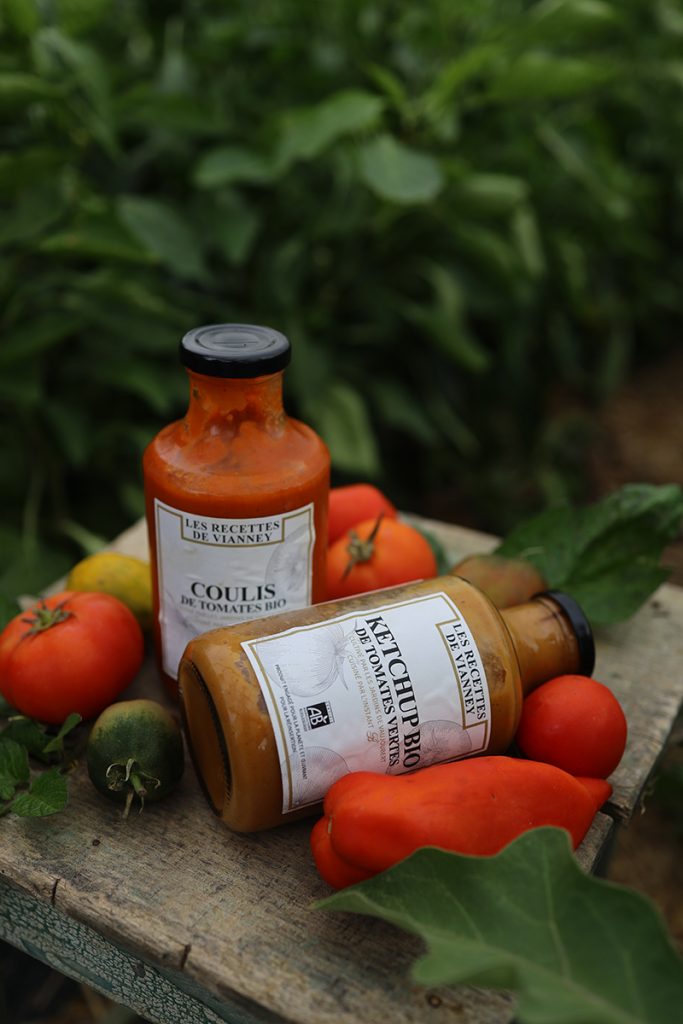OUR SMALL STEPS
All articlesLa Maison Bellanger is committed to a responsible purchasing approach.
Today La Maison is under the directorship of Vianney Bellanger who has enthusiastically and passionately taken over the family business, enriching it with a shop in Tours (2014), a 3rd shop in Le Mans (2018) and then in Laval (2023).
In 2018, Vianney Bellanger set himself the objective of making 90% of his purchases within 200km of Le Mans within a period of five years.
Here we are, in 2023, and we can take stock has this challenge been achieved? What were the main difficulties and what was the impact on the company?
When the decision was taken in 2018, the first step was to make a list of supplies, then to see the origins and volumes of purchases for each one of them. Then we had to define the priorities and find alternatives, one by one, in the full knowledge that for certain ingredients such as vanilla or cocoa it would be impossible to source them locally.
Priority was given to packaging, which at that time was made in China and represented a significant volume. Today, 80% of paper and cardboard packaging is manufactured in the West of France. Only metal boxes, some of the card boxes and luxury bags are still sourced in Asia, until a French alternative is found.

In terms of ingredients, all available raw materials are now purchased locally and in short supply chains whenever possible: the flours are from Sarthe and produced organically, 85% of continental fruits and vegetables are local and from the West of France. La Maison Bellanger buys red fruit in large quantities in season to produce homemade fruit purees.
These purées are then frozen so that they can be used throughout the year. Also, in addition to reducing its carbon impact by sourcing local products, Vianney Bellanger is contributing to the economic development of the region and the promotion of local products.
As far as citrus fruits are concerned, La Maison Bellanger has chosen to source them from Sicily, as Menton can no longer supply them. They have them delivered all at once, at the time of peak season, at the beginning of the year. This allows both to guarantee the full ripeness of the fruits and to reduce the impact of transport by limiting it to a single delivery.
Although he did not examine the possibility of locally sourcing chocolate, Vianney Bellanger still took a close interest in the items he was accustomed to using. He identified several items that lacked transparency with regard to the origin of the beans or their method of production and he took the decision to no longer order them. Thus he is now certain that his chocolates are made from fair trade cocoa, which is not responsible for deforestation or child labour and above all provides the farmer with a living wage.

The benefits of local supplies.
Sourcing local:
* means knowing your raw material: how and where it is grown/manufactured
* means investing in the economic fabric of your region
* means it's better to know local actors and possibly develop partnerships, identify synergies.
So for example, Maison Bellanger obtains its supplies from the Les Jardins de Vaujoubert farm, an organic farm committed to an integration process for helping people in difficulty return to employment. In this ESS (Social and Solidarity Economy) model, the Farm used to lose its unsold vegetables at the end of the season, especially green tomatoes. In order to reduce food waste, Maison Bellanger developed a skills-based sponsorship with the Farm: providing equipment, premises and know-how to create and produce organic green tomato ketchup and organic coulis made from unsold products. This created more chances for the teams of the farm to return to work in real conditions and to get even closer to the job market. The Chocolate Factory had to obtain Bio approval for its products… this took a little struggle!
The richness of these environmentally responsible initiatives, no matter how small they may seem, is that they always lead to a success often much greater than we could have imagined.
The initial intention is often to reduce the negative impact that an action can have on the environment (here CO2 emissions related to long-distance supplies) and the results most often go far beyond this. Reducing the negative environmental impact can have an added positive impact: on the environment, on the local ecosystem, and on the teams…
Congratulations to La Maison Bellanger for all these inspiring examples!

Marie Loones for relais Desserts
Leave a Reply Cancel reply
BRIEFLY
Laurent Le Daniel has just been named a Chevalier dans l’Ordre National du Mérite. Congratulations to him for this prestigious award, which rewards a passionate pastry chef very invested in the sustainability of his profession.
Prepare Valentine’s Day! Take the time to discover the chocolate or fruity sweets offered by our chefs for sale online. By ordering this week you will be delivered on time.
The French team is selected for the Pastry World Cup! She won the European Cup ahead of Italy and the United Kingdom who are also selected for the grand final in January at Sirha.
JOBS
Pâtisserie
La maison Zanin recrute pour son laboratoire de Sallanches un Second pâtissier en CDI – 39h. Toutes les informations ici !
Pâtisserie
La maison Ducobu, en Belgique, recrute sur différents postes. Toutes les informations ici.





